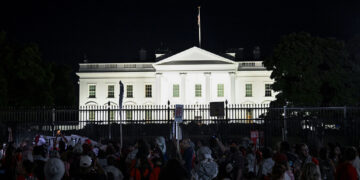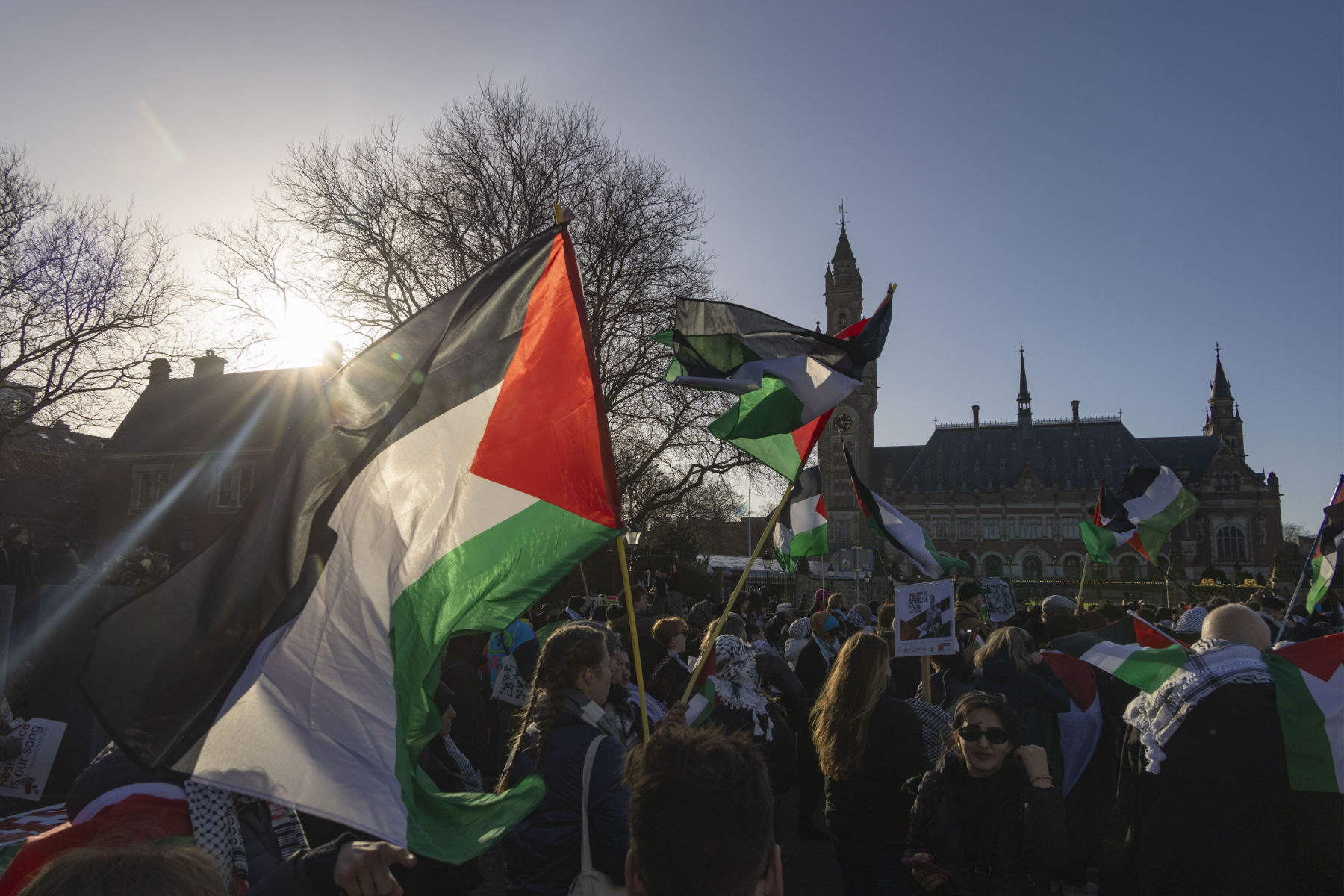The following report is a summary of the proceedings from Bridging Restraint and Positive Engagement: Toward a New Framework for U.S. Middle East Policy, an expert workshop convened by DAWN and the Yale Law School that focused on how and why a U.S. foreign policy rooted in restraint can and should be reformed to fulfill America's international legal obligations and human rights commitments. The proceedings at this workshop were conducted under the Chatham House Rule, meaning that participants were free to use the information received, but neither the identity nor the affiliation of the speakers, nor those of any other participant, could be revealed.
—This report was prepared by Lillian Avedian
Bringing together a diverse group of academics, activists, think tank analysts, and experts with deep knowledge of the Middle East, Bridging Restraint and Positive Engagement provided a forum to debate whether it would be possible to devise a new normative framework for U.S. foreign policy in the region that goes beyond the strategy of restraint. Speakers proposed approaches that would ground U.S. policies in respect for human rights and align U.S. interests with more active, engaged policies that contribute to positive, democratic change in the region, while rectifying the harms to which the U.S. has contributed.
Panelists discussed the merits and limitations of a more restrained U.S. foreign policy, including its failure to articulate a comprehensive and positive vision for U.S. engagement that also meet America's international obligations to uphold human rights. They also debated the power and influence of defense industry lobbyists and foreign governments over policymakers in Washington that prevent meaningful reform of U.S. foreign policy. Finally, they questioned how the role of the U.S. globally should be recalibrated in a new multipolar world.
The workshop was guided by several overarching questions:
- Is it possible to devise a new normative framework capable of aligning American interests with proactive policies that contribute to positive change within the region and rectify harms to which the U.S. has contributed?
- Can we overcome the financial incentives provided by the defense industry, foreign governments and their lobbyists to U.S. government officials to shift American foreign policy in the region?
- How can the U.S. reorient its regional approach to support positive, democratic change in the Middle East, while at the same time restraining American military power—undergirded by notions of U.S. primacy and hegemony—and decoupling U.S. strategic interests from unsustainable autocratic rulers? What would such a proactive, engaged U.S. policy that benefits U.S. interests and supports democracy and human rights look like?
- How can a positive framework for engagement address the challenges of other states, including China and Russia, moving in to fill the vacuum of a demilitarized U.S. in the region?
Following opening remarks, the workshop consisted of two sessions. During each session, brief presentations by three panelists were followed by group discussions. The first panel focused on the benefits and limitations of a purely restraint-oriented approach to foreign policy. The second panel considered constructive alternative approaches to U.S. foreign policy that bridge the merits of restraint and the gaps it leaves in responsibility and accountability for the MENA region.
Session I: Conceptualizing Restraint and Its Limitations
The first panel explored the advantages and limitations of a restraint-oriented approach to U.S. foreign policy. The first panelist argued in defense of restraint as a strategy for U.S. foreign policy and summarized the key tenets of this approach. Restraint emerged after the Cold War as a response to failed attempts to remake the world to resemble the U.S. A foreign policy of restraint cautions against ambitious social engineering projects to transform other societies, particularly through the use of military force. While the U.S. should limit its own military presence abroad, it should also curtail efforts of other countries to achieve global dominance. The panelist argued that in the MENA region, rather than treat some countries as sacrosanct allies with "special relationships" and others as pariahs, the U.S. should maintain normal diplomatic relations with all governments, which would allow Washington to be a more effective mediator especially in regional conflicts.
The second panelist considered the limitations of a foreign policy framework based purely on restraint. While they welcomed restraint as a countervailing influence to militarized, interventionist U.S. foreign policy in the post-9/11 era, they countered that the U.S. still has an important role to play in the world, especially in the MENA region. They argued that criticism of U.S. foreign policy over the past two decades in part stems from increasingly unrealistic expectations of what U.S. power can accomplish abroad. Advocates for a foreign policy of restraint can overstate the centrality of the U.S. in various global conflicts, for example, and its capability to shape outcomes.
While discussing the notion of restraint in U.S. foreign policy, several panelists emphasized that the concept does not lend itself to a one-size-fits-all application. One panelist challenged the application of restraint in U.S. policy toward countries like Egypt, Saudi Arabia and Israel, while another posited that restraint is not a monolithic strategy but a set of tactical approaches suited to different contexts.
Several panelists debated the impact of U.S. involvement in the war in Yemen, highlighting the conflict as a testing ground for restraint in U.S. foreign policy. One panelist said that the capability of the U.S. to end the war in Yemen by halting its support for the Saudi-led coalition fighting the Houthis has been exaggerated, considering the complexity and multiplicity of actors involved on the ground. Another said that ending U.S. military engagement in Yemen, through its support for certain warring parties, is a favorable outcome of a more restrained foreign policy. Some panelists argued that restraint shows an understanding of the limits of American power, while others cautioned that a simplistic approach may overlook the complexities of the war in Yemen and the broader regional dynamics.
While there was some disagreement on the impact of the U.S. role in Yemen, panelists were largely in agreement in criticizing another element of American policy in the MENA region: U.S. efforts to broker diplomatic normalization between Saudi Arabia and Israel. One panelist said a normalization deal would tacitly endorse the continuation of apartheid in Israel, undermining Palestinian rights. Another said the implicit purpose of Israel-Saudi normalization is to recalibrate the influence of the U.S. in the region in response to the rise of China and a multipolar world order.
The next panelist focused on the limitations of restraint, arguing that it neglects Washington's legal and ethical obligations in the MENA region. They advocated for a middle ground between restraint and intervention, asserting that too much restraint can be calamitous for countries facing crisis and upheaval. They broadened the definition of intervention beyond military action to constructive engagement with the purpose of upholding the rules-based international order and preventing mass human suffering. This paradigm for intervention also differentiates between regimes and societies and aims to empower societies rather than authoritarian leaders.
The panelist's assertion that dictatorships generate crises and lead countries down the path of collapse generated a lively discussion. One panelist countered that autocratic resilience and continuity have defined the MENA region for decades, during periods of both conflict and relative calm. Another said that mass revolts like the 2011 Arab uprising are inevitable due to the deep despair across the region, and that the U.S. must start considering how it will react to future mass mobilizations. A third panelist argued that it is impossible to accurately assess the durability of authoritarian regimes, as long as they are maintained through U.S. support.
Panelists also engaged in a lively debate about the U.S. role in Syria. One argued that the Assad regime's actions have been the primary cause of Syria's civil war and collapse, rather than destabilization by foreign governments like the U.S. Another countered that U.S. involvement in Syria has been characterized by an absence of clear strategy and a propensity for "solutionism" rather than more realistic and restrained engagement. Panelists also discussed whether the U.S. approach to Syria was shaped by fear in the shadow of the outcomes of its intervention in Libya. One panelist suggested that the U.S. took measures in Libya that it would not have taken in Syria, because the U.S. would not launch an armed intervention that could potentially destabilize a country that borders Israel, due to the geopolitical stakes.
The panel explored U.S. security commitments across the region, highlighting ethical concerns regarding military ties and potential defense pacts between the U.S., Saudi Arabia and Israel. One panelist noted that such deals are often crafted by a narrow set of actors in Washington, with minimal consultation from across governmental departments. With the geopolitical landscape continually evolving, some panelists called for a reevaluation of the U.S. role in the Middle East, with oil dependency shifting toward Asia cited as one key factor challenging traditional U.S. approaches to the region.
To conclude, one panelist suggested that grassroots activists from the MENA region oppose the restraint framework as amoral, short-sighted and unsustainable, if it forgoes any U.S. support for human rights and democracy. Some activists in the MENA region striving for political, economic and social change regularly look to the U.S. for active support in their efforts. U.S. foreign policy should be guided by considerations of the people they directly impact living in the MENA region and their human rights, dignity and security.
In concluding, the panelists stressed that U.S. engagement in the region is often influenced by a complex interplay of internal and external factors, both abroad and at home. Decisions are not based solely on strategic interests, but are also intertwined with domestic political considerations, lobbying pressures and historical ties.
Session II: A Positive Normative Strategy for Engagement
The second panel discussion considered a normative strategy of positive U.S. engagement in the world and its limitations. The first panelist identified areas of shared interest between different countries where there is possibility for diplomatic cooperation. These include tackling climate change, which will have a disproportionate impact on the MENA region; promoting human rights; addressing refugee crises, such as through resettlement programs; and promoting global health. The panelist proposed an alternative foreign policy approach that combines the virtues of restraint with a focus on practical engagement in areas such as human rights and climate change. They emphasized the importance of American soft power and sustained diplomacy as effective tools in human rights promotion.
The panelist raised the United States President's Emergency Plan For AIDS Relief (PEPFAR), which is at risk of losing funding due to abortion policy debates in Washington, as an example of a global health program that can produce benefits with flat financial resources from the U.S. PEPFAR has saved millions of lives across the African continent with a budget of $3 billion a year, a low cost relative to its net benefits. Since coercion is not well suited to advancing human rights, democracy and other value-based commitments, the U.S. can adopt other soft-power approaches, such as through public and private diplomacy and multilateral forums.
The second panelist concurred that soft-power approaches, such as trade, development aid, sanctions, conflict mediation, refugee support and regional diplomacy, can all be effective alternatives to military force. The panelist argued that the past three U.S. administrations, under Barack Obama, Donald Trump and now Joe Biden, have all tried and failed to craft a restraint-led approach to the MENA region after the overcommitment to the "War on Terror" of the George W. Bush years. The Obama administration was able to draw down troop levels in the region and had diplomatic success with the Iran nuclear deal, or JCPOA, but was pulled into the upheavals of the Arab Spring and conflicts in Libya and Syria. Trump expressed his desire to dial down U.S. military engagement in the region, yet his administration was captured by anti-Iran hawks in the Republican Party and lobbying by Gulf states.
The Biden administration's approach to the MENA region resembles a return to foreign policy during the Cold War, under which the region is a zone of contestation for great powers—now, the U.S., China and Russia, compared to the U.S. and the Soviet Union—where competition calcifies around different global hegemons. This approach attempts to counter China and Russia's influence in the region amid the rise of multipolarity. The panelist warned that this approach reduces flexibility in U.S. foreign policy, bolsters autocracies and undermines human rights.
The panelists engaged in a lively discussion about the proper response by the U.S. to China and Russia's maneuvers in the MENA region. One panelist posed a question: How can one quantify the real dangers presented by China and Russia's engagement in the region? Another panelist reframed this question as: What are the dangers of allowing a new Cold War in the Middle East? They argued that a Cold War-like standoff between opposing blocs undermines regional security and enables nuclear proliferation. Another panelist added that regional competition between the U.S. and other rising global powers will continue, as long as the belief persists in American exceptionalism and that U.S. global supremacy serves the best interests of humanity, which is deeply entrenched in American politics and society.
The third panelist identified the outsize influence of authoritarian regimes and the U.S. defense industry on American policymakers as a structural impediment to advancing policies that best serve the interests of the American people and protect human rights, dignity and security. While the defense industry hires hundreds of lobbyists in Washington to push for arms sales, military aid and other elements of a militarized U.S. foreign policy, dictatorships in the MENA region provide massive payouts to U.S. politicians, creating an irresistible incentive structure for Washington to serve the interests of authoritarian regimes. The panelist argued in favor of laws that prohibit U.S. officials from working for foreign governments when they leave office for at least three years and limit campaign donations from lobbyists.
The panelists deliberated the impact of foreign government influence and lobbying on U.S. foreign policy. One said that American interests are often viewed as being in conflict with the interests of people living in the MENA region, noting that the defense and energy industries, both of which have powerful lobbying arms in Washington, create jobs for the U.S. economy. They advocated for reconceiving of American interests so that they are not in such tension. Another panelist added that while arms sales account for a fraction of U.S. employment, the defense industry has a disproportionate political effect on U.S. policy.
To conclude, the panelists agreed that preventing nuclear proliferation should be a central aim of U.S. foreign policy in the MENA region, along with promoting regional cooperation and development. Several panelists agreed that the U.S. nuclear non-proliferation strategy, which was behind the Iran nuclear deal and other policies in the region going back decades, has given way to enabling a nuclear proliferation spiral. One panelist warned of the potential for Saudi Arabia, Iran and the United Arab Emirates to join Israel in becoming nuclear states within a few years. Another warned that allowing for the formation of calcified blocs of rival alliances in the region would lead to nuclear proliferation and more nuclear-armed countries.
A panelist added that the interests of many people living in the Gulf and the interests of the U.S. converge in two areas: preventing nuclear proliferation and containing the rise of Saudi Crown Prince Mohammed bin Salman as a single hegemonic actor in the region, which can be achieved through the reformulation of U.S. foreign policy toward the Gulf.
The various perspectives offered by the panelists underscore the complexities and ethical quandaries associated with U.S. foreign policy in the Middle East. There is a pressing need for a nuanced, multidimensional approach that considers both short-term actions and long-term consequences. As the U.S. navigates its foreign policy, it must continuously strive for a balanced approach. While safeguarding U.S. national interests, it is equally crucial to acknowledge the intricate dynamics of the MENA region and prioritize ethical engagements. This dual focus would pave the way for a more harmonious relationship between the U.S. and countries in the MENA region, fostering mutual respect and cooperation.
In sum, several of the panelists agreed that, while restraint has important merits and can reverse the harm caused by U.S. military interventions in the MENA region, restraint can be combined with forms of positive engagement to overcome its limitations. Positive engagement can be exercised through soft-power tools at America's disposal that are not military intervention. A foreign policy framework that combines the merits of restraint and engagement can uphold U.S. values and promote human rights, democratization and collaboration. This approach would require a long-term strategy that may not yield results in the short term but will have much greater advantages for both the U.S. and MENA countries than the current status quo in U.S. foreign policy.





































